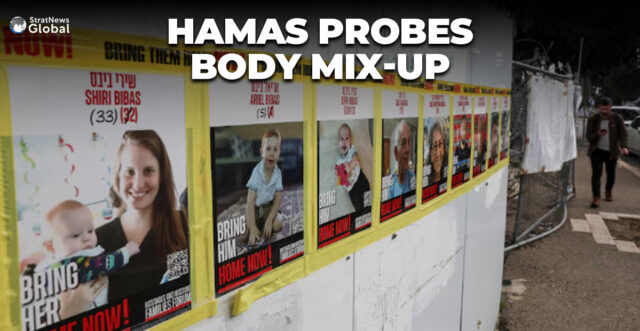Hamas announced on Friday that it was investigating a potential mistake in identifying human remains handed over to Israel as part of a ceasefire agreement, while Israeli Prime Minister Benjamin Netanyahu warned of retaliation over the failure to return the body of hostage Shiri Bibas.
Hamas was due to hand over the bodies of Shiri Bibas and her two sons Kfir and Ariel on Thursday along with the remains of a fourth hostage under the ceasefire deal that has halted fighting in Gaza since last month.
Four Bodies Returned
Four bodies were delivered and the identities of the Bibas boys and the other hostage, Oded Lifshitz, were confirmed.
But Israeli specialists said the fourth body was that of an unidentified woman and not Bibas, who was kidnapped along with her sons and her husband, Yarden, during the Hamas attack on Israel on October 7, 2023.
Basem Naim, a member of the Hamas political bureau, said “unfortunate mistakes” could occur, especially as Israeli bombing had mixed the bodies of Israeli hostages and Palestinians, thousands of whom were still buried in the rubble.
“We confirm that it is not in our values or our interest to keep any bodies or not to abide by the covenants and agreements that we sign,” he said in a statement.
Hamas said separately that it would investigate the Israeli assertions and announce the results.
Netanyahu Threatens Retaliation
The failure to hand over the body and the staged public handover of the four coffins on Thursday, caused outrage in Israel and drew a threat of retaliation from Netanyahu.
“We will act with determination to bring Shiri home along with all our hostages – both living and dead – and ensure Hamas pays the full price for this cruel and evil violation of the agreement,” he said in a video statement, accusing Hamas of acting “in an unspeakably cynical manner” by placing the body of a Gaza woman in the coffin instead of Bibas.
Hamas said in November 2023 that the children and their mother had been killed in an Israeli air strike and Ismail Al-Thawabta, director of the Hamas-run Gaza government media office, said Netanyahu “bears full responsibility for killing her and her children.”
But the Israeli military said intelligence assessments and forensic analysis of the bodies of the Bibas children indicated that they were deliberately killed by their captors. Chief military spokesperson Daniel Hagari said the boys were killed by the militants “with their bare hands”, but gave no details.
The UN Human Rights Office said it had no information of its own on the death of the hostages and called for an effective investigation into the causes of their deaths.
“The return of the remains of the deceased is a basic humanitarian goal,” the office said.
Netanyahu gave no details of a possible Israeli response, but the incident underscored the fragility of the ceasefire agreement reached with U.S. backing and with the help of Qatari and Egyptian mediators last month.
Saturday Exchange
Six living hostages are due for release on Saturday in exchange for 602 Palestinian prisoners and detainees, according to Hamas, and the start of negotiations for a second phase of the ceasefire is expected in the coming days.
“Hamas must return the hostages as agreed in the ceasefire- the living and the deceased,” Israeli military spokesperson Nadav Shoshani said in a statement on social media platform X. “They have to bring Shiri back, and they have to release the 6 living hostages expected tomorrow.”
Netanyahu’s office confirmed it had been officially informed of the names of the six hostages to be released, which Hamas sources said was expected at around 8.30 a.m. (0630 GMT).
Gaza Ceasefire’s Fate
As the tension over the Gaza ceasefire rose, Netanyahu ordered the Israeli military to intensify operations in another Palestinian territory, the occupied West Bank, after a number of explosions blew up buses standing empty in their depots near Tel Aviv.
No casualties were reported but the explosions were a reminder of the campaign of suicide attacks on public transport that killed hundreds of Israeli civilians during the Second Intifada in the early 2000s.
(With inputs from Reuters)





